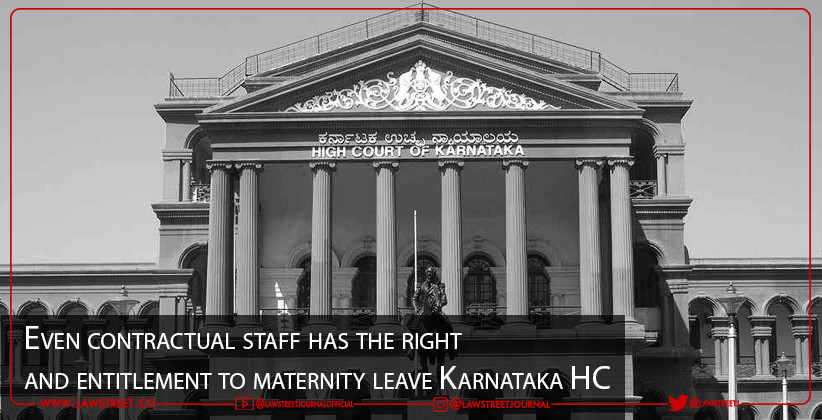A single bench of the Karnataka High Court with Justice M Nagaprasanna, allowed a women employed on a contractual basis to rejoin her services, adding men who man such offices become insensitive to the issue of the kind that is alleged in the petition, it would become "power at wrong hands
The court disallowed the notice issued to the woman by the Directorate of Municipal Administration which was to terminate her services.
The Court, orderering in her favour, ruled that even a contractual staff has the right and entitlement for a maternity leave.The Court said, the petitioner was entitled to maternity leave of six months in all in terms of the amended Act of 2017 (supra). The action of the second respondent cannot be countenanced, as maternity or the Act does not classify or qualify a mother to be, a government servant, temporary employee, employee on contract basis or an employee on daily wages. The order impugned infers such an harrowing classification"
After the amendment of the Maternity Benefit Act in 2017, a pregnant woman was to be entitled to maternity leave for as long as 6 months and 15 days.
This matter is to do with petitioner, B.S.Rajeshwari, who was appointed as a Information Officer for a project that started in 2009, contracts being renewed annually, the latest being from April 2019 to march 2020. The petitioner applied for a maternity leave which she was not granted and was still asked to report on her duties. On not reporting on her duties, an order terminating her employment and further services was passed, cancelling her contract on the project giving the reason of her absence. She says, I chose motherhood the State chose to terminate me.
The petitioners Advocate Subramani M.A., that the law was very clear on the fact that a notice for termination of services cannot be passed, referring to the Courts order in writ petition No.44563/2013 dated 05.09.2018. He argues that the notice passed against his client was contrary to the law.
In response to the above, the State represented by Additional Government Advocate submitted that the employee was working on a contractual basis and the contract itself gave the respondent the right to terminate.
The Court, after looking onto the past history of the concept of maternity found that Article 1 of the Universal declaration of Human Rights recognizes that all human beings are born free and have equal dignity and rights. Further Article 42 of the Indian Constitution lays down the provision that the state shall have to make provisions for ensuring and securing proper conditions at the workplace as well as maternity leave.
Justice Nagaprasanna of the Karnataka Bench, imposed a payment of Rs.25,000 on the State government which must be paid to petitioner B.S.Rajeshwari. The Court observed the State and its instrumentalities cannot deny its obligation to perform its duty as enshrined in the aforesaid Articles upon making reference to court judgements of Olga Tellis v .Bombay Muncipal Corporation reported in (1985) 3 SCC 545 as well as Mohini Jain (Ms.) Vs. State Of Karnataka (1992) 3 SCC 666 which dealt with the ruling that directive principles are fundamental rights when in governance of this country








